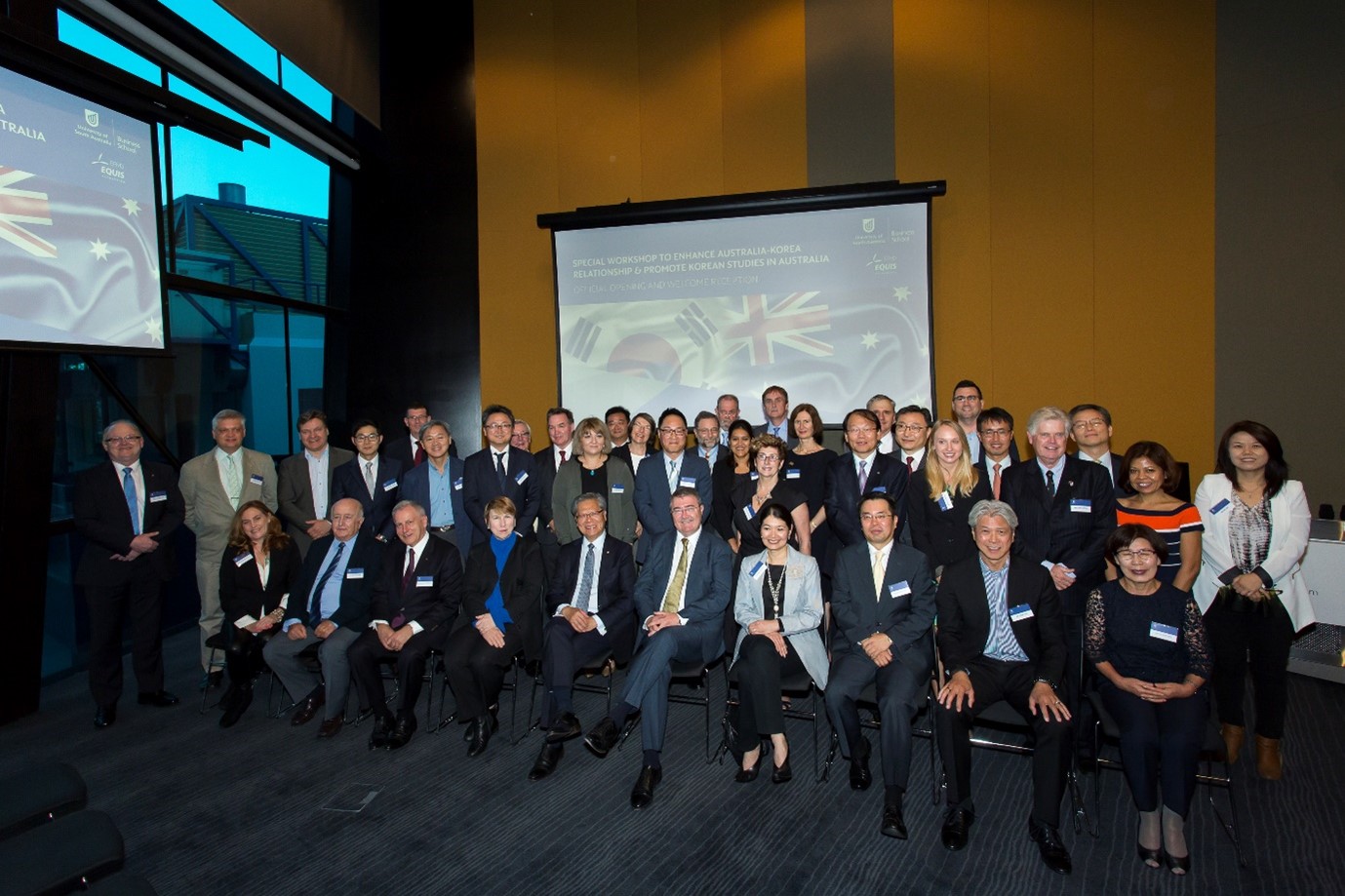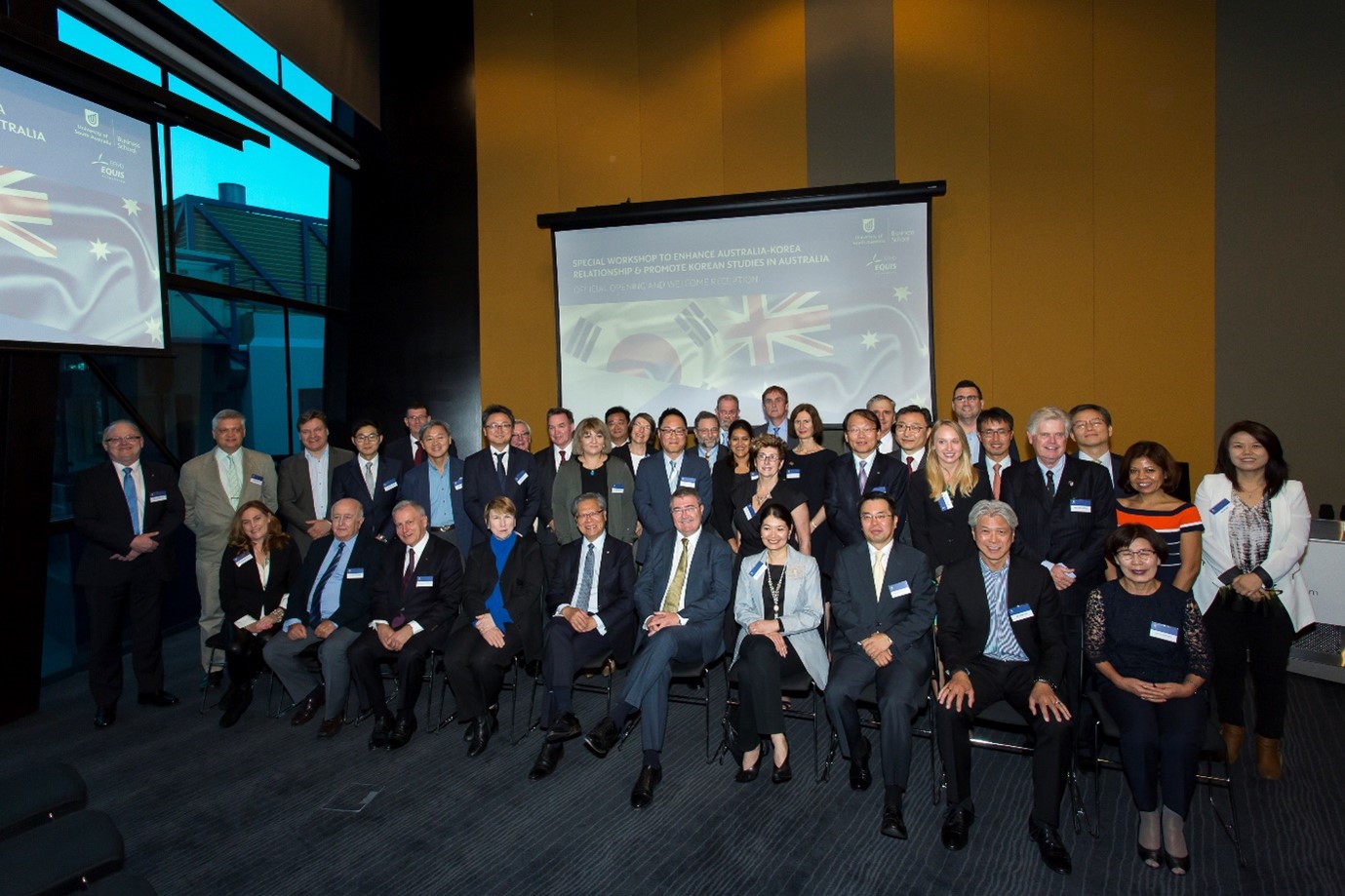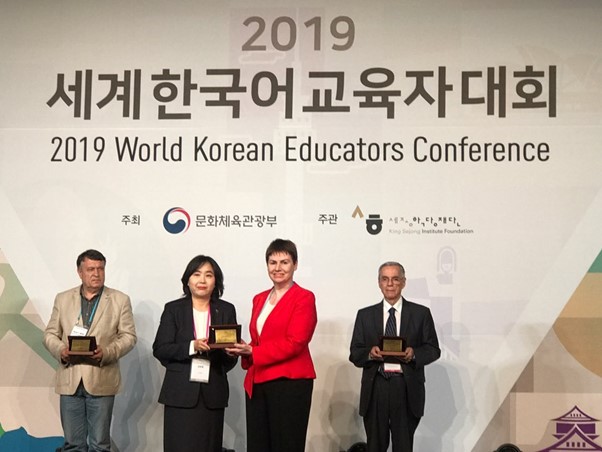-
해외 한국학자를 만나다: 남호주대학교
-
Meeting with Korean Studies Scholars Abroad
-
이유일(남호주대학교)
1. 먼저 한국학진흥사업단 뉴스레터 독자들을 위해 자기소개 부탁드립니다.
안녕하세요. 저는 남호주 수도인 애들레이드에 있는 남호주대학교 경영대학에서 국제경영학 교수로 재직 중인 이유일입니다. 현재 경영대학의 경영학 및 마케팅학 학장을 맡고 있고 2017년 한국 세종학당재단과 호주 시드니 한국문화원과의 협력을 기반으로 출범하게 된 남호주대학교 애들레이드 세종학당의 학당장이기도 합니다.
2. 현재 호주에서는 K-pop, 영화, 연극 등 문화예술계에 한류가 불고 있다고 들었습니다. 호주 내에서의 한국에 대한 관심이나 인식은 어떠한가요?
최근 몇 년 사이 한국 음악과 드라마를 중심으로 호주에서도 한국 문화를 사랑하는 사람들이 많이 늘어났습니다. K-pop의 선두 주자인 BTS, 블랙핑크 등 다양한 아이돌 그룹이 호주 10대 20대들의 마음을 사로잡았고, 더불어 넷플릭스(Netflix)가 한국 문화를 호주에 알리는 데 큰 영향을 끼치며 넷플릭스를 통하여 한국 영화와 드라마를 시청하게 된 분들이 한국의 언어와 문화를 궁금해하기 시작했습니다. 그들이 한국의 문화를 사랑하게 되면서 언어를 배우고자 노력하게 되었고 그 결과 한국이라는 나라에 대한 관심과 호감도가 매우 높아졌습니다.
한류 문화는 호주에서 시드니, 멜번 등과 같이 대도시로 급속히 퍼져감을 느낄 수 있습니다. 과거에는 아시아 가족 배경을 가진 호주인들을 중심으로 한류 열풍이 불었다면 최근에는 경계 없이 다양한 호주인들에게 한류 열풍이 불고 있습니다. 이러한 영향은 시드니나 멜번 등 주요 도시와는 달리 '한류 불모지'나 다름없었던 2021년 6월 기준 인구 137만여 명인 이곳 애들레이드에서도 체감할 수 있습니다. 그러나 한국으로 유학, 이민 혹은 취업을 목표로 하는 적극적인 한류보다는 한국의 문화를 즐기는 것으로 만족하는 한류가 애들레이드 한류의 특징이라고 볼 수 있습니다. 이렇듯이 애들레이드의 한국학 혹은 아시아학(Asian Studies)에 대한 관심도는 호주 내 다른 지역(시드니, 멜번, 브리즈번, 퍼스)과 비교해 볼 때 남호주 내에서는 아직 낮은 편이라고 볼 수 있습니다.
3. 남호주대학교에서의 한국학 프로그램이나 연구 활동 등을 소개해 주시고 향후 수요는 어떠한지 설명 부탁드립니다.
우리 대학에서의 한국학과 아시아학 프로그램은 아직 초기 단계라고 볼 수 있습니다. 그러나 2017년부터 남호주대학 주최로 열리는 한국학 및 한호 관계 증진을 위한 학술 심포지엄 시리즈는 지금은 연례 행사로 자리 잡았으며, 2017년 애들레이드 세종학당 출범과 이후 한국학진흥사업단의 해외한국학씨앗형사업과의 연계를 통하여 교수진, 대학원생, 지역공동체, 정책당국 등과 함께 심도 있는 한국학 관련 사업을 진행하고 있습니다. 이를 통해 대학과 지역사회의 한국에 관한 관심과 인지도가 빠른 속도로 높아지고 있습니다.

2017년 3월 27일 남호주 대학교에서 열린 '한국과 호주 관계 증진 및 호주 내 한국학 발전을 위한 특별 워크숍' 개막식 기념사진. 개막식에는 휴 반 르(Hieu Van Le), 당시 남호주 주 총독, 짐 맥도웰(Jim McDowell) 남호주 대학교 명예 총장, 빌 패터슨(Bill Paterson) 전 주한 호주 대사가 참여했으며, 호주 한국학 학자들과 한호 관계 증진 관련 주요 기관인 한국학중앙연구원, 호-한 경제협력위원회, 멜번 코트라 무역관, 호-한재단, 호주 외교통상부, 대양주한국학회, 주호주 한국대사관, 주시드니한국문화원, 주시드니한국교육원들이 자리를 함께했습니다.
2017년 출범 이후 800명을 훨씬 웃도는 다양한 국적과 배경문화의 학생들이 남호주 대학과 애들레이드 세종학당을 통해 한국어와 한국 문화를 체험하게 되었습니다. 또한 2017년 시작된 한국학진흥사업단의 해외한국학씨앗형사업과의 연계를 통하여 지난 5년간 (2017-2021) 10회 이상의 한국학 및 한-호 관계 증진 관련 학술 심포지엄을 성공적으로 개최하였고, 전세계 유수의 출판사를 통해 그간의 학술 활동을 출판하여 호주를 넘어 세계로 한국학을 알리는 가교 구실을 담당하고자 큰 노력을 해왔습니다.

2019년 7월 문화체육관광부 주최, 세종학당재단 주관의 세계 한국어 교육자 대회에서 애들레이드 세종학당이 우수 세종학당으로 선정되었습니다. 감사패 수여식에 참석한 당시 강현화 세종학당재단 이사장과 현 남호주 대학교 명예 총장 폴린 카(Pauline Carr).
4. 남호주대학교는 2017년부터 해외한국학씨앗형 사업에 참여해 오고 있으며 2020년부터 "학제간 한국학 교육과 연구력 강화를 위한 발전 계획" 프로젝트를 수행하고 있습니다. 현재까지 프로젝트는 어떻게 진행되고 있으며, 교육 현장에서 겪는 어려움이 있다면 무엇일까요?
남호주 대학교는 현재 남호주 내의 3개 대학(남호주 대학교, 플린더스 대학교, 애들레이드 대학교) 중 한국어 및 문화 프로그램을 제공하는 유일한 대학입니다. 진행되고 있는 씨앗형 사업의 최대 목표는 한국학진흥사업단과의 협력을 통해 남호주대에서는 물론 국내외로 한국학 프로그램의 필요성과 중요성에 대한 인식을 높임과 동시에 한국학의 세계화에 이바지할 수 있는 토대를 마련하는 것입니다. 특히 한국학 연구의 세계화와 한국학 학자 육성 분야에 역점을 두고 실행에 노력하고 있습니다.
씨앗형 사업과 대학의 적극적인 지원으로 동북아시아 관련 서적의 최고 권위 출판사 중 하나인 영국의 루트리지 출판사를 통해 한국과 동북아 정치경제 관련 다수의 단행본이 출판되었고 사업이 시작된 후 한 해도 거르지 않고 한국학과 관련된 성공적인 국제 학술 세미나와 심포지엄을 개최함으로써 호주 내에서의 한국학 학자 육성을 노력하고 있습니다. 또한 2021년 설립된 남호주 대학교 경영대학 부설 국제경제 시대의 기업 다이내믹스 연구센터(C-EDGE)와의 연구 협력 동반관계를 맺고 있으며, 한국과 남호주대학 학제 간 공동 연구 및 출판, 박사학위 연구원 공동 지원 및 연구(한국과 호주 관계 분야의 박사 과정 연구원), 커리큘럼 개발/대학원과 학부 과정 신규 과정 지원, 국제학술회의 공동 개최 및 지원 등에 있어 함께 협력하고 있습니다. 물론 2020년 3월 중순에 발생한 코로나 팬데믹 이후 호주 국경선이 2022년 2월 20일까지 폐쇄됨에 따라 2020/2021년 실행할 연구계획 및 프로그램에 대한 남호주 대학교의 전략적 계획실행에 어려움이 있었습니다. 다행히도 많은 부분은 재개되었으며 성공적으로 진행되고 있습니다.
5. 해외한국학씨앗형 사업 수행 중, 혹은 그 이후 꼭 이루고 싶은 장기적 목표나 바람이 있다면 무엇일까요?
비록 한국학에 관한 관심과 연구가 빠른 속도로 진행되고 있지만 오랫동안 호주 대학에서의 아시아학은 주로 중국, 일본, 인디아 혹은 동남아시아 관련 연구가 주류를 이루고 있었습니다. 따라서 우리 대학뿐 아니라 다른 호주 대학에서 진행되고 있는 한국학 발전 사업들이 상호 보완적인 비교연구가 필요하며 친한 전문인력, 호주인 한국학자 발굴 및 양성과 육성(관련 과목 및 학과 개설, 대학원)에 필요한 성공적인 인프라 구축의 밑거름이 되기를 바랍니다. 이러한 성공은 가까운 미래에 한국학이 호주에서의 아시아학을 선도하는 대표적인 학문으로 발전하는 계기가 될 것입니다.
6. 저희 질문에 대한 상세한 답변에 감사드립니다. 마지막 질문을 드립니다. 한국과 호주 양국의 한국학 연구를 위해 함께 할 수 있는 일이 있을까요?
한국학의 호주에서의 성공적인 정착과 나아가서 세계화의 기틀을 다지기 위해서는 우리 모두의 열정과 지속적인 노력이 필요하다고 생각합니다. 호주 정부 통계에 따르면 코로나 팬데믹 이전 호주의 등록 유학생 수는 2020년 3월 54만 2,413명이며 나라 분포 역시 매우 다양하게 나타나고 있습니다. 한국학의 세계화는 이들을 통해서도 다양하게 발전될 수 있다 봅니다.
만일 호주 내에서의 한국학 및 그와 관련된 교육의 발전을 이뤄진다면 좀 더 많은 수의 한국 전문가를 배출하여 그들이 귀국 후 각자의 나라와 영역에서 여러 종류로 한국의 이해도를 높이고 한국을 알리는 데에 있어서 선도적 역할을 담당할 수 있으리라 봅니다. 따라서 한국에 현존하고 있는 호주 전문학자 및 연구소와 호주 내에 있는 한국 전문가 및 교육 관련 연구소 그리고 대학과의 긴밀한 협조 방안 및 전략을 함께 고민해 보는 것이 어떨까 싶습니다.
-------------------------------------------------------------------------------------------------------------------------
Meeting with Korean Studies Scholars Abroad
You-il Lee (University of South Australia)
1. First, please introduce yourself to the readers of the KSPS Newsletter.
Hello. My name is You-il Lee, and I am Professor of International Business and Dean of Management and Marketing Programs at the University of South Australia Business School, located in Adelaide, the capital of South Australia. I am also the director of the King Sejong Institute Adelaide at the University of South Australia, which was established in 2017 in collaboration with the King Sejong Institute Foundation and the Korean Cultural Centre AU in Sydney.
2. It is said that the Korean Wave, in the fields of culture and arts such as K-pop, cinema, and theatre, is currently seeing success in Australia. In Australia, what is the current level of understanding and interest in Korea?
In recent years, Australia has seen an increase in people who love Korean culture, mostly Korean music and dramas. With K-pop as the front runner, idol groups such as BTS and Black Pink have been a hit with Australian teens and 20-somethings. Moreover, Netflix has been a big influence in making Korean culture known in Australia. Through Netflix, people who watched Korean films and dramas become curious about the Korean language and culture. As they fall in love with Korean culture, they try to learn the language, and as a result, their interest in and positive feelings toward Korea have risen greatly.
One also can sense how Hallyu culture is quickly spreading in major Australian cities, such as Sydney and Melbourne. In the past, the Hallyu Wave was popular only among Australian families with Asian backgrounds, but recently it has become popular among a wide variety of Australians regardless of their ethnic background. This influence can be felt in Adelaide, with its population of 1.37 million people as of June 2021, which had been a so-called “Hallyu wasteland” when compared to major cities such as Sydney or Melbourne. The Korean Wave in Adelaide can be characterised as a passive satisfaction with enjoying Korean culture, rather than an active pursuit of study abroad, immigration, or employment in Korea. Likewise, the interest in Korean Studies or Asian Studies in South Australia is quite low compared to other regions in Australia such as Sydney, Melbourne, Brisbane, and Perth.
3. Please introduce the Korean Studies programs and research activities at the University of South Australia and explain the upcoming demand for these programs.
The Korean Studies and Asian Studies programs at the University of South Australia are still in their infancy. However, through various in-depth Korean Studies-related projects involving faculty, postgraduate students, local organisations, and policymakers, interest in and understanding of Korea at the university and in the local community has quickly grown. These projects include an annual academic symposium series hosted by the university since 2017 for the promotion of Korean Studies and Korean-Australian relations, the establishment of the King Sejong Institute Adelaide in 2017, and the subsequent involvement with the KSPS Seed Program for Korean Studies.

Commemorative photo taken at the opening ceremony of the “Special Workshop for the Promotion of Korea-Australia Relations and the Development of Korean Studies in Australia” held at the University of South Australia on 27 March 2017. Guests included the then governor of South Australia, Hieu Van Le, the chancellor of the University of South Australia, Jim McDowell, the Australian ambassador to Korea, Bill Paterson, as well as Korean Studies scholars and key figures related to the promotion of Korea-Australia relations from institutions such as the Academy of Korean Studies, the Australia-Korea Business Council, the Korea Trade-Investment Promotion Agency in Melbourne, the Australia-Korea Foundation, the Australian Department of Foreign Affairs and Trade, the Korean Studies Association of Australasia, the Embassy of the Republic of Korea in Australia, the Korean Cultural Centre AU in Sydney, and the Korean Education Centre in Sydney.
Since its establishment in 2017, the King Sejong Institute Adelaide at the University of South Australia has introduced the Korean language and culture to over 800 students of diverse nationalities and cultural backgrounds. In connection with the KSPS Seed Program for Korean Studies which began in 2017, we have worked hard to serve as a bridge for the promotion of Korean Studies in Australia and the rest of the world through the successful hosting of over ten academic symposia related to the promotion of Korean Studies and Korea-Australia relations over the past five years (2017-2021), and through publishing academic activities with world-renowned publishing companies.

The King Sejong Institute Adelaide was selected as an outstanding King Sejong Institute at the World Korean Educators Conference held on July 2019, which was hosted by the Ministry of Culture, Sports, and Tourism and overseen by the King Sejong Institute Foundation. Pictured at the awards ceremony are the then director of the King Sejong Institute Foundation, Kang Hyeon-hwa, and the current chancellor of the University of South Australia, Pauline Carr.
4. The University of South Australia has participated in the Seed Program for Korean Studies since 2017. Since 2020, the university has been carrying out a Seed Program project to strengthen interdisciplinary Korean Studies education and research. Thus far, how has the project been going, and what difficulties have you faced?
The University of South Australia is the only university among the three universities in South Australia (including Flinders University and the University of Adelaide) to provide a Korean language and culture program. The ultimate goal of the current Seed Program project is, through collaboration with KSPS, to increase the awareness of the necessity and importance of a Korean Studies program not only at the University of South Australia but also both domestically and internationally, while at the same time laying the groundwork for contributions to the globalisation of Korean Studies. In particular, we have placed an emphasis on the globalisation of Korean Studies research and the fostering of Korean Studies scholars, which we are working hard to accomplish.
Through the Seed Program and the active support of the university, several books related to Korean and East Asian politics and economics have been published by the British publishing company Routledge, which is one of the most respected authorities in publications on East Asia. Since the start of the project, successful international academic seminars and symposia have been held each year without fail, contributing to the fostering of Korean Studies scholars in Australia. Since the establishment of a collaborative research partnership with the Centre for Enterprise Dynamics in Global Economies (C-EDGE), founded in 2021, various joint efforts have been undertaken, such as joint interdisciplinary research and publication between Korea and the University of South Australia (Business School and C-EDGE), joint funding of postgraduate researchers (doctoral researchers studying Korea-Australia relations) and research projects, curriculum development and funding for new undergraduate and postgraduate programs, and joint hosting and funding of international academic conferences. Of course, from the onset of the Covid-19 pandemic in mid-March 2020 until the reopening of Australia’s borders on 20 February 2022, the University of South Australia faced difficulties in strategically carrying out its planned research and programming for 2020-2021. Fortunately, many things have resumed and are progressing successfully.
5. What long-term goal or wish do you want to be achieved during or after this Seed Project for Korean Studies?
Although interest in and research on Korean Studies is progressing quickly, for a long time, Asian Studies at the University of South Australia has focused mainly on China, Japan, India, and Southeast Asia. Therefore, I hope that the Korean Studies promotion projects being conducted not only at our university but at other Australian universities, as well, can become the foundation for the successful development of infrastructure needed for mutual comparative research and the discovery/fostering of Korea-friendly experts and Australian Korean Studies scholars (through the establishment of related courses, departments, and postgraduate programs). In the near future, this success will spark the development of Korean Studies into a representative scholarly field of Asian Studies in Australia.
6. Thank you for your detailed answers to our questions. In conclusion, what work can be done by Korea and Australia for Korean Studies in both countries?
I think that our combined passion and continuous effort are needed in order for Korean Studies to find its footing in Australia and, moreover, establish a foundation for globalisation. According to statistics by the Australian government, there were 542,413 international students registered to study in Australia as of March 2020, prior to the Covid-19 pandemic. And of course, the nationalities of these students are diverse.
I believe that the globalisation of Korean Studies can be advanced in diverse ways through these students. If more experts on Korea are produced, they can then return to their home countries and respective professional fields and increase awareness of Korea in various regards. I believe that such individuals will play a leading role in achieving the development of Korean Studies and related education. Therefore, I suggest that experts on Australia in Korea, experts on Korea in Australia, education-related research institutes, and universities all come together to think about a direction and strategy for close collaboration.
-
글쓴날 : [22-06-30 11:49]